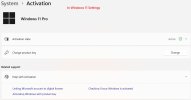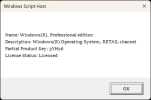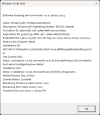britechguy
Well-Known Member
- Reaction score
- 5,098
- Location
- Staunton, VA
And I'm serious . . .
Here is what I see in Windows 11 Settings:

and here is what's in the Microsoft Account to which this license is linked:

Now, I can tell you how I arrived at the current state of affairs, but I'm going to start by giving only the information any given one of us has available to us when we sit down in front of a machine with which we have zero familiarity, and where you can count on the owner to have no idea whatsoever, other than of the Windows version the license is for, if that.
I know how I arrived at the place I did, but if I didn't, I still cannot figure out how in the hell I'd ever ferret it out. There's nothing whatsoever that indicates OEM versus Retail or anything else.
This is why I say that I will not, ever again, play gatekeeper for Microsoft or any other company when it comes to anything other than new OS or software installs on computers that have never had any form of Windows or a given piece of software on them. I can't possibly know what license type (OEM vs. Retail) I'm dealing with based on the information provided on the computer, and if I'm dealing with someone who has a local account, and only a local account, on the machine I'm in front of what I can know is even less.
If I could lift the SSD out of this laptop, plonk it into one that was purchased to replace it, which already came with an OEM Windows license and the above is what continued to display when looking at the new device, that means that the license is active, and by Microsoft's own vetting, valid, on the device on which it's running. If it were to say it's not activated, then I'd try to activate it, and depending on whether it did, or did not, would purchase another license if necessary.
Here is what I see in Windows 11 Settings:

and here is what's in the Microsoft Account to which this license is linked:

Now, I can tell you how I arrived at the current state of affairs, but I'm going to start by giving only the information any given one of us has available to us when we sit down in front of a machine with which we have zero familiarity, and where you can count on the owner to have no idea whatsoever, other than of the Windows version the license is for, if that.
I know how I arrived at the place I did, but if I didn't, I still cannot figure out how in the hell I'd ever ferret it out. There's nothing whatsoever that indicates OEM versus Retail or anything else.
This is why I say that I will not, ever again, play gatekeeper for Microsoft or any other company when it comes to anything other than new OS or software installs on computers that have never had any form of Windows or a given piece of software on them. I can't possibly know what license type (OEM vs. Retail) I'm dealing with based on the information provided on the computer, and if I'm dealing with someone who has a local account, and only a local account, on the machine I'm in front of what I can know is even less.
If I could lift the SSD out of this laptop, plonk it into one that was purchased to replace it, which already came with an OEM Windows license and the above is what continued to display when looking at the new device, that means that the license is active, and by Microsoft's own vetting, valid, on the device on which it's running. If it were to say it's not activated, then I'd try to activate it, and depending on whether it did, or did not, would purchase another license if necessary.


